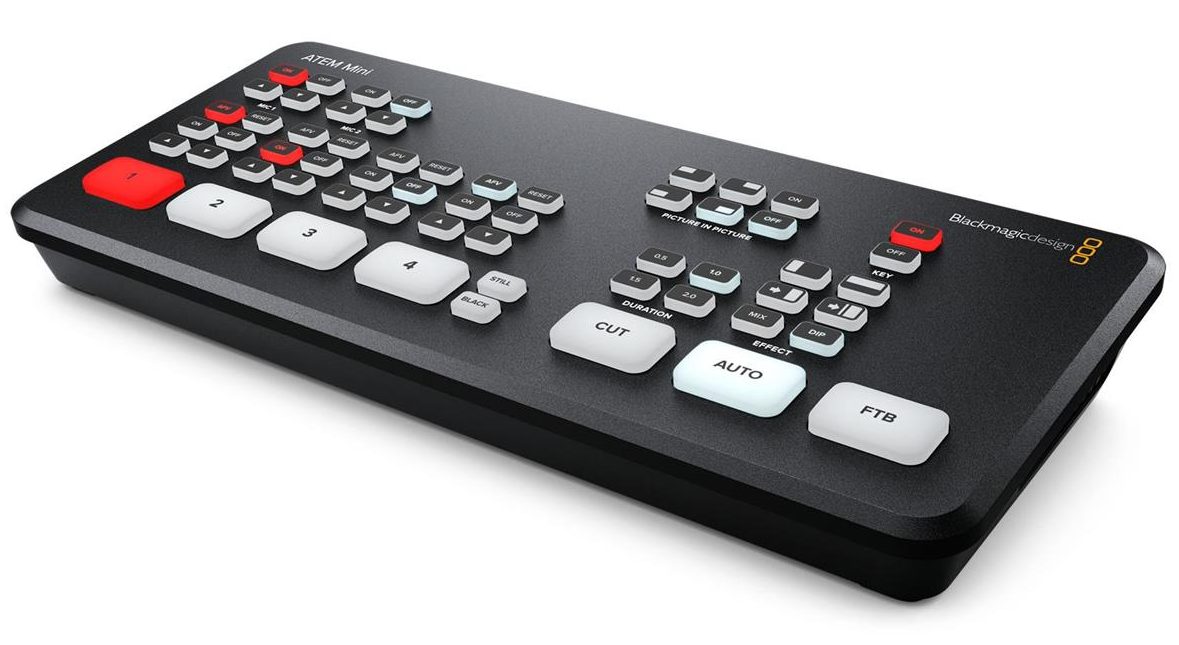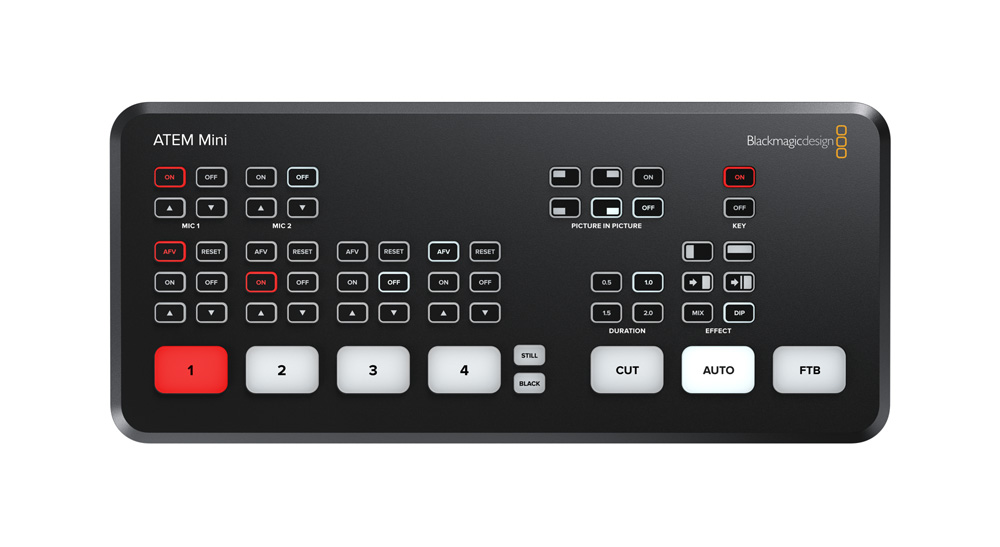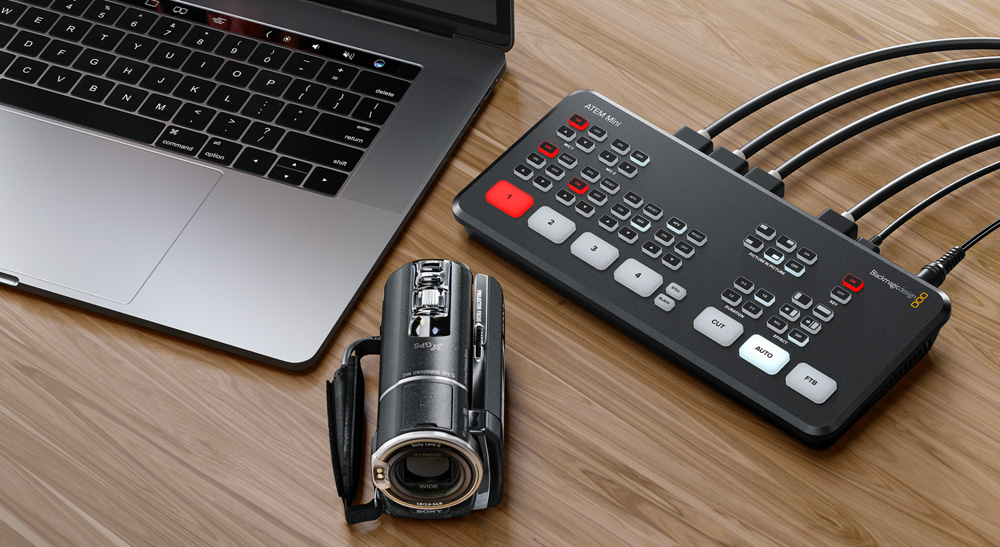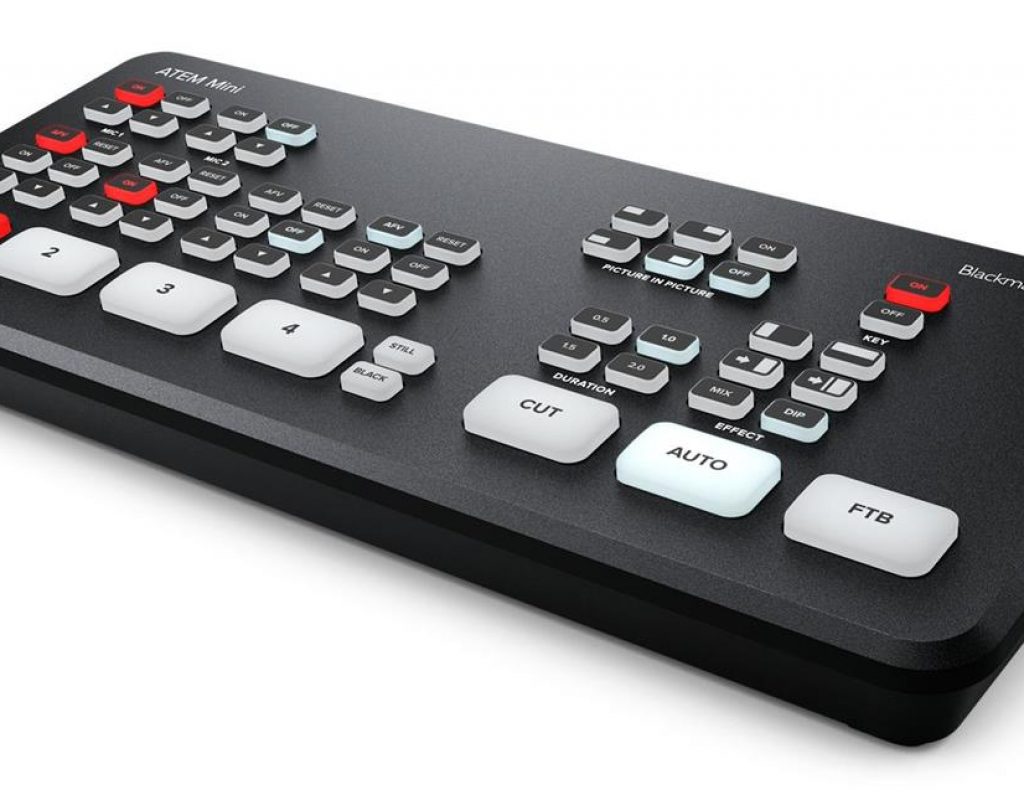My review of the Blackmagic Design ATEM Mini was my longest-running test. Why did the equipment review take so long? I first tested the ATEM Mini in early 2020, you know, before a global pandemic. I then asked Blackmagic Design to send it back to me because everything had changed. Everything changed. I wanted to wait until the ATEM Mini went from backorder status worldwide to available for purchase. Since I started reviewing the ATEM Mini, Blackmagic Design read the collect zeitgeist of a world reeling from sudden shelter-in-place orders and the astronomical rise in video conferencing and released the ATEM Mini Pro. A slightly more expensive with more features built specifically for web video streaming. 
I want to answer the question in this equipment review: Does the ATEM Mini make better sense for you and your business? Look, the economy crashed, a global pandemic is circling the globe, and production trickles back for many. The difference in price between the ATEM Mini and the ATEM Mini Pro is only USD 200. I tend to work this way, “Take care the pennies and the dollars will take care of themselves.” – William Lowndes.
ATEM Mini
Let’s dive into the ATEM Mini, shall we? Easy of use. The ATEM Mini is easy to use. The control surface features large tactile backlit buttons. Establishing a “finger memory” to use the control surface without looking at the ATEM Mini was quick and easy. The buttons are big enough with enough of a near-perfect amount of push resistance to give you confidence that you have selected the source you needed. 
This “finger memory” was vital for me because I mostly used the ATEM Mini while I was on-camera for a Video Conference Call or interview. I need to be able to talk to an “A” camera but then switch to a “B” camera and keep my head up and present. Both the ATEM Mini and ATEM Mini Pro have this kind of button feature. Even my 3-year old daughter had fun playing with the ATEM Mini buttons and changing cameras on the monitor. I love putting her photos in my write-ups. Don’t @ me. When you’re a Mother or Father, you may do the same. It’s the same reason I feature her in many of my camera reviews.
ATEM Mini Audio
I am a full-blown camera dork, and even I know visuals are only as good as the audio, though it took me years to realize this hard-and-fast truth. The ATEM Mini comes with two dedicated 3.5mm audio inputs. More importantly, the ATEM Mini takes embedded audio from any of the HDMI sources. Why are the HDMI inputs valuable during stay-at-home orders and WFH life? Because you can record just about any input from say, a computer output, allowing you to record a Zoom, Skype, FaceTime, Blue Jeans, and just about any video conferencing app as an input source. Both the ATEM Mini and ATEM Mini Pro have this feature.
What’s great about the ATEM Mini and ATEM Mini Pro is the built-in Fairlight audio mixer, allowing users to make a complex audio mix. Audio from the four HDMI stereo inputs and the two dedicated stereo mic inputs give 12 channels of audio to mix. While this is amount of audio complexity is terrific, I believe most users may not use the full capacity. But, hey, the feature is there for users to grow into when needed. 
Pro WebCam
I do not know about you, but I grew tired of the built-in MacBook Pro headshot pretty early into working from home. I am a camera professional, and I wanted my shot to reflect my skills with great lighting and framing. With the dedicated USB-C output on both the ATEM Mini and ATEM Mini Pro, you can plug in one HDMI camera source and have a professional camera for Zoom meetings. At $295, the ATEM Mini is very affordable. I’ve only found a handful of other similar devices; notably, the AJA stands out, but it is slightly more expensive with fewer features but still great. Hey, maybe four HDMI inputs are more than they need. An important thing to remember, the ATEM Mini is a switcher first that happens to stream video and audio.
I am not a professional production director. Switchers are not a massive part of my professional life. I tend to focus on the camera. The ATEM Mini was built for someone like me in mind. Someone who does not have a wealth of knowledge surrounding the latest production switcher technology. What makes the ATEM Mini successful, Blackmagic Design built it to be simple to use by someone like me. If you are new to multi-camera shoots, then the ATEM Mini is a great way to get your feet wet. There are just enough features to grow and learn more about multi-camera production. 
But, I think most ATEM Mini users are here for the webcam feature. Yes, the one element that has become one of the most important during a global pandemic. I’m talking about the USB-C output from the ATEM Mini. I have a sneaking suspicion most ATEM Mini users are plugging in one single HDMI input and outputting from the ATEM Mini to laptop to harness the professional camera and audio. Thus giving their Zoom meetings, or any video conferencing app, a spit and polished professional look to it. I am definitely guilty as charged. In this regard, the ATEM Mini is still one of the less expensive options. And, it is just starting to emerge from backorder hell. FYI, Texas ** cough** Media **cough** Systems have the ATEM Mini in stock. Sorry, Filmtools.
ATEM Mini Key Features
- 4-Channel Live Stream HDMI Switcher
- Input/Output up to 1080p60 10-Bit 4:2:2
- 2-Channel Digital Audio Mixer
- HDMI Output, Ethernet ATEM Control
- Media Player, Computer Input Support
- Upstream and Downstream Keyers
- DVE Transition, Chroma/Luma Keyers
- Color and Pattern Generators
- USB Type-C Streaming/Webcam Output
Available transitions include:
- Cut: When you press the cut button, ATEM instantly changes from your current program source to the preview source. Cuts can be performed by directly selecting sources or by pressing the cut button to switch to the next source.
- Mix: The mix, or dissolve, gradually transitions from one source to the next by creating a smooth blend. You can set custom timings to manually blend the transition.
- Dip: Just like mix transitions, a dip transition is a gradual blend that includes either a solid color, graphic, or another clip between the two video sources. Dips to black or white between sources are the most popular, or you can use logos or sponsor graphics.
- Wipe: Built-in wipe patterns include circles, diamonds, squares, and more. Shapes and patterns can be inverted or softened, and can even have customized colored borders.
- DVE: With the powerful built-in Digital Video Effects processor, or DVE, you can push, spin, squeeze, or swoosh your live video from one camera to the next with incredible built-in transitions. DVE transitions can be flip-flopped and reversed, giving you even more transition options.














